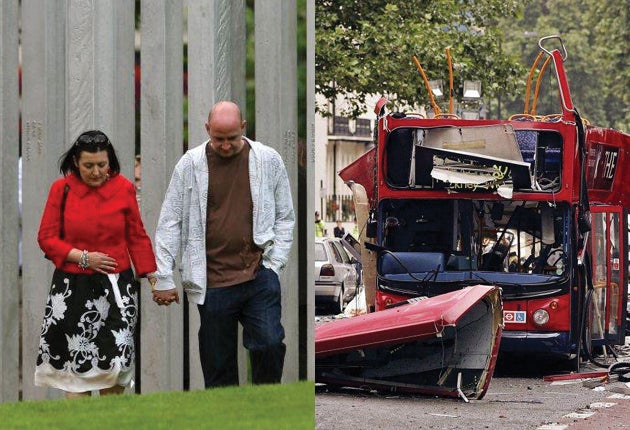Survivor tells July 7 inquest of 'luckiest escape'

Your support helps us to tell the story
From reproductive rights to climate change to Big Tech, The Independent is on the ground when the story is developing. Whether it's investigating the financials of Elon Musk's pro-Trump PAC or producing our latest documentary, 'The A Word', which shines a light on the American women fighting for reproductive rights, we know how important it is to parse out the facts from the messaging.
At such a critical moment in US history, we need reporters on the ground. Your donation allows us to keep sending journalists to speak to both sides of the story.
The Independent is trusted by Americans across the entire political spectrum. And unlike many other quality news outlets, we choose not to lock Americans out of our reporting and analysis with paywalls. We believe quality journalism should be available to everyone, paid for by those who can afford it.
Your support makes all the difference.Lisa French came round from the blast to see the bus behind her had disappeared. The spot where she had first intended to sit was simply wreckage.
Yesterday, the inquest into the 7 July 2005 bombings, in which 52 commuters were killed in the worst single terrorist atrocity on British soil, turned its attention to the 13 people who perished on the number 30 bus at Tavistock Square, central London.
For many, the image of the devastated bus, which the youngest terrorist Hasib Hussain, 18, destroyed nearly an hour after the three London Underground bombings, proved the most graphic image in a day of horror.
The inquest heard poignant tributes to the passengers who died, many of whom had boarded the bus after their Underground journeys were disrupted by the initial explosions. Several had phoned their families to reassure them minutes before Hussain detonated his bomb.
Ms French was overcome with emotion as she explained to the inquest how she had almost sat next to Hussain at the back of the top of the double decker but decided there would not be enough room for his rucksack and her laptop. She picked a seat four rows in front of him.
She recalled waking from the blast: "There were no seats left behind me attached to the bus. There was literally no bus left. It just dropped down behind our seats."
Louise Shepherd, a passenger seated next to her, was lying with her head on her knees, she explained, adding: "I remember seeing her sit up, and I knew one of the most amazing things I would ever see in my life was to see this woman wake up."
Ms French, who said she was "very lucky" to escape with perforated ear drums, broken teeth, cuts and bruises, broke down as she recalled seeing a mass of entwined bodies as she made her way off the bus.
Ms French, a BT employee from Newcastle upon Tyne, had been due to attend a business meeting in Angel, north London, and switched to the bus after finding King's Cross underground station closed.
Evidence already heard by the inquest suggests Hussain planned to set off his bomb on the Underground at the same time as his fellow terrorists. But it apparently failed to go off and he was captured on CCTV emerging from the Tube at King's Cross station and joining commuters evacuated after the initial blasts at about 8.50am. He bought a replacement battery before boarding a number 91 bus and then the number 30.
Another survivor described an equally amazing escape. Anita Dybek-Echtermeyer described how she had been on the crowded 91 bus with Hussain and was struck by how nervous, exhausted and sweaty he looked. Disruption caused by the earlier Tube bombs meant that the number 91 bus terminated early at Euston station and everyone had to get off.
Ms Dybek-Echtermeyer, then a PhD student at Queen Mary, University of London, tried unsuccessfully to get on the number 30 and decided to continue her journey on foot. "I walked a few steps, maybe 10 metres, and then I felt this huge noise and this blast of air. I turned and I saw the bus going into the air and I just ran," she said.
The loss of life in the bus bombing could have been worse if it had not taken place outside the headquarters of the British Medical Association (BMA), the inquests, at the Royal Courts of Justice in London, heard. Doctors attending meetings at the BMA rushed outside and began treating the injured and dying immediately.
Among the family statements was one from the mother of the oil executive Anthony Fatayi-Williams, 26. The young man, who worked for the multi-national engineering firm Amec, helped other confused commuters before getting on the London bus. His mother Marie said his death had left a "yawning vacuum".
Join our commenting forum
Join thought-provoking conversations, follow other Independent readers and see their replies
Comments